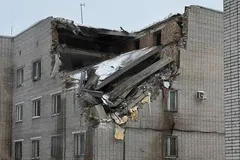
This statement made by the head of the State Bank of Vietnam conveys two messages at the same time. First, the current difficulties of real estate enterprises are mainly due to the problems within the enterprises and created mainly by enterprises themselves. Second, credit is not a magic wand or a gift to enterprises that can change the current scenario completely.
Liquidity crisis
Many real estate enterprises had begun to face serious liquidity shortage in the second half of 2022. Recommendations to create conditions for real estate enterprises to access credit and remove bottlenecks in projects was raised. Many people are of the conception that real estate projects or the real estate market in general are related to many industries and fields, such as jobs creation, income for labor, consumer materials, and supply of housing, so if the real estate projects stagnate many industries and fields will also be in the doldrums, and then the lack of housing will cause housing prices to be pushed up.
At a recent real estate credit conference organized by the State Bank of Vietnam, leaders of many commercial banks analyzed that liquidity difficulties were caused by the several shortcomings within the structure of the real estate market. These shortcomings have been proven by specific figures that are enough for credit institutions to remain wary. One, 80% of the supply is in the high-end segment which is not suitable for the real needs of the people and is difficult for people to access and more speculation is likely to happen. Two, credit for real estate is much higher than average, and by the end of 2022 the total outstanding credit for the real estate sector by credit institutions was about VND 2,580.000 bln, an increase of about 24% compared to 2021. This is one of the sectors with the highest growth, accounting for 21.2% of the total outstanding loans to the economy and the highest in the last five years.
Data provided by the State Bank of Vietnam also coincides with the assessment of the Ministry of Construction that the market no longer has affordable projects, and the average segment projects have become fewer in numbers over the years. In addition, individual corporate bonds have become a large capital channel and because mobilizing these is too easy businesses remain subjective and do not maintain a target plan. As a result, when investors withdraw capital, businesses immediately start facing difficulties. There are so many real estate enterprises deploying 50 projects at the same time, so when faced with difficulties, they are unable to proactively handle them.
The problem of solving credit problems for real estate enterprises is a difficult problem in the current context. Because even though banks do not tighten credit for real estate businesses, they now have to be careful to avoid risks when giving out loans. The project itself does not guarantee legality and is not a collateral, hence a bank cannot disburse capital.
For a long time now, there have been many opinions that real estate enterprises in Vietnam are too dependent on credit channels. There is even a belief of implicit links between commercial banks and real estate companies which lacks transparency and objectivity in the issuance of individual corporate bonds. This also shows that real estate businesses depend too much on credit channels which creates risks for both businesses and banks, especially when the market is subject to so much volatility.
Effect on economy
When looking at neighboring countries, the data reported by the National Bureau of Statistics of China released in mid-January 2023 showed that the growth rate of the real estate market greatly affected the overall growth of the country's economy as the real estate sector accounts for a quarter of this growth. This is also the main reason why the Government of China recently made a move to rescue the real estate market so as to avoid a domino effect from crashing the market. This was a lesson learnt after the Evergrande debacle that occurred at the end of 2021.
Some statistics coming from the Ministry of Construction say that the average contribution of the construction and real estate industries towards GDP growth rate in recent years accounts for about 11% of the total budget revenue. In this, the real estate industry directly accounts for about 4.5%, contributing about 0.5 percentage points to GDP growth on an average.
Currently, the market capitalization of the real estate industry is estimated at VND 1,700.000 bln to VND 1,800.000 bln. When the real estate crisis occurred, the banks could not recover the loan principal and interest, and the contractors and the building material suppliers were unable to collect the receivables. Project stagnation upset many homebuyers which created serious concerns within the structure of real estate businesses.
However, what is currently of great public concern is how the Government will bail out the real estate businesses. It is to be seen whether Vietnam will apply a similar support policy like China for the real estate enterprises across the country or whether the government will join hands in debt settlement and therefore help revive large real estate corporations that are now nearly on the brink of collapse.
It is a fact that during the last three years, real estate businesses have sent many petitions to the Government to ask for special mechanisms to help them recover from their ongoing difficulties. In addition to the proposal to remove difficulties in accessing credit channels and corporate bond issuances, there was also a proposal to apply for a business model restructuring, loan extensions and grace periods of two to three years, in line with the enterprise cash flow without being considered as bad debt. At the same time, there was a call to appoint a State-owned commercial bank to provide a credit line to continue the construction of unfinished projects. Such proposals are unprecedented in the real estate market.
Zero-dong solution
According to some experts, Vietnam can consider a zero-dong solution for real estate businesses. In the period 2008 until 2013, the Government implemented special control measures to handle the financial crisis and then proceeded to buy back zero-dong from some weak banks. This saved the financial system and it gradually stabilized. Now, when real estate is in a similar situation, the Government can intervene in a similar way. The Government can control and can buy back for zero-dong the bad assets. This will prevent several real estate enterprises that are burdened with debts to prevent a market crash.
According to Dr. Cấn Văn Lực, a member of the National Monetary and Financial Policy Advisory Council, the State should not use the budget to support and bail out the real estate market, because this is the concern of the market and the State can only create a mechanism. Besides investors and businesses must also share the risk.
While discussing this issue, Prof. Dr. Đặng Hùng Võ, former Deputy Minister of Natural Resources and Environment, said that the zero-dong solution can be considered a possible solution at this time. Professor Võ acknowledged that this is not a new solution and many countries around the world have done it before and many have succeeded and saved the market from collapse. In essence, he believes this is still Mergers and Acquisitions (M&A) of enterprises, as enterprises that do business with difficulties or losses will either have to be restructured or be sold or merged, which is also normal, but the important thing here is to let the market self-regulate and avoid too much administrative intervention.
Specific policies for the real estate market will be considered by the Government in the near future. However, real estate businesses in particular and the real estate market in general in Vietnam today definitely needs a complete overhauling in terms of management and infrastructure.
| Currently, the market capitalization of the real estate industry is estimated at VND 1,700.000 bln to VND 1,800.000 bln. When the real estate crisis occurred, the banks could not recover the loan principal and interest, and the contractors and the building material suppliers were unable to collect the receivables. Project stagnation upset many homebuyers which created serious concerns within the structure of real estate businesses. |
| Specific policies for the real estate market will be considered by the Government in the near future. However, real estate businesses in particular and the real estate market in general in Vietnam today definitely needs a complete overhauling in terms of management and infrastructure. |




















